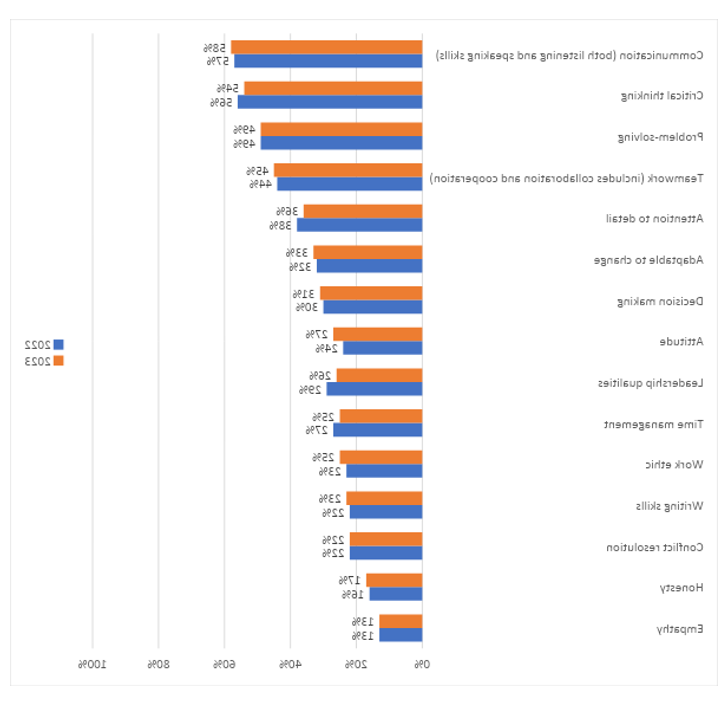In an era in which artificial intelligence is redefining boundaries and global regulations are dynamically adapting, the ISACA professional community stands at the nexus, sifting through vast data to unveil the critical trends that are reshaping the cybersecurity industry. Surprisingly, our latest findings in ISACA’s State of Cybersecurity 2023 report catapult “human skills”—commonly dismissed as “soft skills”—into the limelight, not merely as an important facet but as the most glaring skills gap in the industry today. Far from being peripheral, these human skills are becoming the linchpin in an increasingly interconnected and complex digital landscape. What you’re about to read is not just an analysis: it's an urgent call to recalibrate our skillset hierarchy. We delve deeply into 15 pivotal human skills, scrutinizing their fluctuating relevance amid rapid AI advancements and sweeping regulatory transformations.
Top Five Soft Skills
The top five most important “soft skills” needed by security professionals in your organization today.

Soft skills that increased in importance
In this section, we evaluate the soft skills that increased in importance in the State of Cybersecurity 2023 report and hypothesize a correlation against emerging trends in AI.
Honesty: Honesty has always been a cornerstone of personal and professional relationships. However, its importance has increased by 1% in the current landscape. This subtle uptick may be due to the more ethical considerations required when dealing with AI systems, LLMs and the evolving regulatory environment that governs them.
As AI systems are becoming more prevalent in making automated decisions based on data, there may be instances where these decisions are hard to interpret or justify. With AI’s automation and decision-making capabilities, the ethical aspects become crucial. A slight uptick in the importance of honesty may reflect the growing need for transparency and ethical accountability in AI usage.
Adherence to global AI regulations is grounded in requirements for transparent handling of AI-driven data.
Writing skills: As AI technologies become more complex, the ability to articulate these complexities has led to the increased importance of writing skills. Documentation and clear communication about procedures, AI logic and outcomes are increasingly important as AI systems take on more complex roles. Strong writing skills are essential for ensuring that the human reasoning behind AI decisions is well-documented.
Work ethic: Work ethic has become more critical as the responsibility to manage and monitor AI systems and adhere to regulations has grown. These traits are increasingly crucial as professionals need to be proactive in updating their skills and capabilities, particularly with fast-changing technologies like AI.
Decision-making: Decision-making has seen increased importance as AI offers more options for and complicates decision-making. As AI systems provide more data and insights, human judgment becomes crucial in selecting appropriate actions or ethical paths, explaining the growing importance of this skill.
Adaptability to change: Adaptability remains crucial, given the speed at which AI technologies and regulations evolve. The cybersecurity landscape is continuously evolving, accelerated by AI advancements. Professionals must be nimble and willing to adapt, which might be challenging for an aging workforce.
Teamwork: Teamwork has increased in importance as AI technologies and regulations require interdisciplinary collaboration. As cybersecurity becomes more integrated, professionals must work in cross-disciplinary teams, often including AI or LLM components. Teamwork becomes increasingly crucial in this environment.
Communication (listening and speaking): Effective communication remains vital as professionals must articulate complex AI topics and understand regulatory changes. Both listening and speaking skills are vital for translating complex AI data into actionable insights and collaborating effectively within diverse teams. This includes explaining the ethical considerations of AI decision-making in layperson’s terms.
Soft skills that decreased in importance
Time management: The importance of time management has slightly decreased as AI and LLMs automate specific tasks, freeing human time for other activities. AI’s ability to automate various tasks reduces the emphasis on time management, as the machines can handle more routine tasks efficiently.
Leadership qualities: Leadership has somewhat decreased in priority due to the collaborative nature of working with AI and navigating regulations. As AI systems can take over some decision-support functions, leadership may be evolving to focus more on coordination between human and machine intelligence, de-emphasizing traditional “command and control” models.
Critical thinking: While AI and LLMs can perform advanced analytics, the role of human critical thinking has diminished slightly as systems increasingly provide suggested courses of action. If AI can handle initial data analysis, the critical thinking aspect of assessing that data may appear less important, though this skill should remain crucial.
Attention to detail: While AI and LLMs handle many details, human attention remains essential for oversight. This skill’s fluctuation suggests a transitional period where AI takes on some detail-oriented tasks but still requires human oversight for ethical and complex decision-making.
Soft skills that remained constant
Problem-solving: Problem-solving remains a constant need, particularly as AI and LLMs introduce new challenges. The stable importance of this skill indicates that while AI can provide significant data analysis, humans are still needed for ultimate decision-making, especially when ethical or complex considerations are involved.
Empathy: Empathy remains constant in importance as AI and LLMs cannot replicate human emotional intelligence. This emotional skill remains vital as AI systems can’t replace human emotional intelligence, which is crucial for negotiation, conflict resolution and customer interaction.
Conflict resolution: Conflict resolution remains a constant need, especially as new conflicts arise with AI integration and regulation. The ability to mediate disagreements and make equitable decisions remains a distinctly human skill set, amplified by the introduction of AI systems that can present complex or controversial options.
The future of technology at stake
In summary, the integration of AI, the advent of LLMs and the sweeping regulatory changes in the AI landscape have reshaped our technical skills and profoundly impacted the value we place on soft skills. These skills, ranging from communication to empathy, are undergoing a metamorphosis, evolving in significance and application.
Whether it’s articulating complex AI algorithms, navigating ethical quandaries or meditating in the nebulous realm of international regulations, the soft skills we once took for granted are now pivotal in shaping the future of technology. As we hurtle into an era where human and machine intelligence increasingly coexist and collaborate, the importance of cultivating these skills has never been more pressing.




